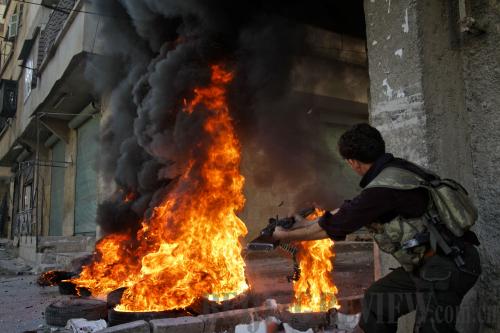|
 |
|
FIERCE BATTLE: Smoke billows from burning tires as a Syrian opposition fighter fires at government forces during clashes in the northern city of Aleppo on November 13 (XINHUA/AFP) |
Under the mediation and support of the United States and some Middle Eastern countries, a new coalition of Syrian opposition groups was formed on November 11 in the Qatari capital of Doha. The newly united opposition, which is named the "Syrian National Coalition for Opposition and Revolutionary Forces," includes most Syrian opposition groups, but has yet to show whether it can bring long-awaited peace to the war-torn country.
Observers said that as the strength of the Syrian opposition increases with the establishment of the new bloc, an opportunity will arise for the opposition to negotiate with the Syrian authorities. But whether the newly formed bloc will seize the initiative is questionable.
"The reshuffle of Syrian opposition groups aims to strengthen the power of the opposition as a whole. But it is still hard to say whether the move is geared toward reaching military goals or achieving to negotiate with the Syrian Government," said An Huihou, a senior visiting researcher with the China Institute of International Studies.
The new Syrian opposition coalition won the recognition of the Arab League, the Gulf Cooperation Council and some Western countries soon after its establishment.
The Arab League recognized the opposition bloc as "the representative of aspirations of Syrian people." Washington also swiftly declared its backing.
"The reshuffle was led by the United States and some countries in the region. Washington wasn't satisfied with the performance of the former coalition, which was loose and ineffective in confronting the Syrian authorities," An said.
He said the total opposition forces have increased somewhat, but whether they would take a unified position is uncertain.
Xue Qingguo, a professor of Arab studies at Beijing Foreign Studies University, said that although the new coalition included most opposition groups, some military factions inside Syria are unwilling to join it. The military power of the new opposition bloc is not guaranteed.
"Besides the goal of overthrowing the Bashar al-Assad regime, there are many divergences among the opposition groups—from religious faiths to interests and from ideologies to crisis-resolving approaches," Xue said to Beijing Review.
"It is very doubtful that the new bloc could form a unified fighting capacity. An immediate ability to turn the situation around is almost impossible," Xue added.
In fact, Syrian opposition groups inside and outside the country have not seen eye to eye with each other on strategies to end the unrest that flared up 20 months ago. The exiled opposition continues to call for foreign intervention, while the Syria-based opposition rejects such an approach and accuses the exiled groups of engaging in a foreign conspiracy.
Luai Hussain, head of the opposition Building Syria State Party, said the agreement reached by the new bloc will further complicate the situation on the ground.
According to the agreement, once the new coalition wins international recognition, it will form an interim government in exile and call for a national conference if the current Syrian administration is ousted. The opposition bloc also agreed to establish a new supreme military council to take overall command of the rebel groups.
During an interview with China's Xinhua News Agency, Hussain said his party will reject anything that comes out of the overseas-based opposition. "The formation of any interim government abroad would be conducive to increasing division in Syrian society, and thus would widen the platform of a civil war," he said.
| 